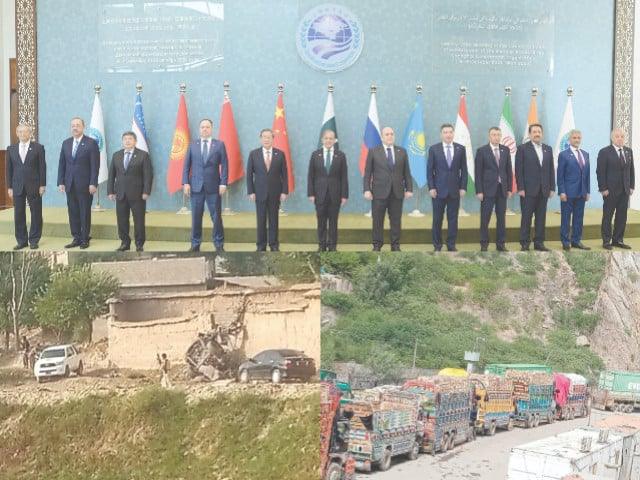ISLAMABAD:
On the night of December 24, Pakistani warplanes carried out strikes inside Afghanistan, capping a tumultuous year on both the security and foreign policy fronts. Pakistan refrained from officially claiming responsibility for the attacks, highlighting the difficult nature of the relationship with Afghanistan.
This was the last thing Pakistan wanted: a strained relationship with the country in which Islamabad has invested so much to promote its strategic and economic interests. Pakistan had to take the hard option after TTP-sponsored terror attacks continued to target security forces in Khyber-Pakhtunkhwa (KP).
Three days before the airstrikes, TTP terrorists attacked a checkpoint in South Waziristan, leaving 16 Pakistani soldiers martyred. That was the turning point, forcing Pakistan to go after its hideouts in Afghanistan. The Pakistani action came on the day when, after a gap of 15 months, a high-powered delegation led by Ambassador Muhammad Sadiq, Pakistan’s special envoy for Afghanistan, was in Kabul, holding talks with Taliban authorities.
Ambassador Sadiq’s visit was part of a renewed push to find a solution to the issue that has undermined ties between the two countries. In the year 2024 there was no respite in terrorist attacks in Pakistan. In fact, the number of attacks has only increased.
Data compiled by the Pakistan Institute of Conflict Studies revealed that terrorism-related deaths in 2024 surpassed 1,000, reaching 1,082 in the first 11 months, with 856 terrorist attacks reported so far this year, compared to 645 attacks in 2023, reflecting worsening security. situation.
At least 245 people, including 68 security personnel, were killed in a series of terrorist attacks and clashes across Pakistan in November. Casualties included 127 terrorists and 50 civilians.
November was the second deadliest month of the year, after August, in which 254 people died, including 92 civilians, 108 terrorists and 54 security personnel. In terms of security personnel casualties, November was the deadliest month of 2024, surpassing October, which saw 62 security force deaths. KP was the worst affected region, with 50 terrorist attacks causing 71 deaths and 85 injuries.
Kurram district witnessed one of the worst tribal clashes in recent history, with more than 120 people killed. Furthermore, according to the report, Balochistan also experienced an increase in terrorist attacks. The series of deadly attacks in Balochistan forced civil and military authorities to launch a comprehensive military operation in the restive province.
With tensions deepening with Afghanistan, the year 2025 may remain volatile.
While the security situation remained challenging for Pakistan in 2024, foreign policy issues kept Islamabad on tenterhooks. There were no improvements in ties with Afghanistan. Hopes of breaking the ice in the relationship with India after the February 8 elections never materialized. The year was a testing period for the relationship between Pakistan and China. The “iron brothers” faced a security challenge in managing their relationship. At least seven Chinese citizens were killed in two different terrorist attacks in 2024.
The Besham attack on March 26 left 5 Chinese engineers dead, while the terrorist incident on October 6 killed 2 Chinese in Karachi. Those incidents forced China to publicly voice its concerns and warned Pakistan that without improved security there will be no progress in the second phase of CPEC.
There was an unprecedented setback in the relationship when the Chinese ambassador had to publicly rebuke Deputy Prime Minister and Foreign Minister Ishaq Dar at a public forum in Islamabad. That forced the Foreign Ministry to issue a statement, calling the Chinese ambassador’s move inconsistent with the close ties between the two countries.
Compounding Pakistan’s woes was the Biden Administration’s decision to attack the country’s long-range ballistic missile program. Pakistan’s long-range ballistic missile program has remained on the US radar for years.
But the United States increased pressure on Pakistan in 2024. Washington imposed sanctions on several Chinese and Pakistani companies linking them to the ballistic missile program. The explosive development came this month when a senior Biden administration official made a surprising claim about why Washington was concerned about Pakistan’s missile program.
A day later, the Biden administration imposed sanctions on four Pakistani entities, including the state-owned National Defense Complex (NDC), and Deputy National Security Advisor Jon Finer claimed that nuclear-armed Pakistan was developing nuclear weapons capabilities. long-range ballistic missiles that could eventually allow it to attack. targets far beyond South Asia, making it an “emerging threat” to the United States.
“So, frankly, it’s difficult for us to see Pakistan’s actions as anything other than an emerging threat to the United States,” Finer said. Pakistani officials called this claim “absurd.” But the U.S. official’s public statement suggested ominous signs for Pakistan’s nuclear and missile program during President Trump’s second term.
But despite those challenges, the year 2024 was an active year for Pakistan’s diplomacy. After a hiatus of many years, Pakistan hosted a summit of regional leaders. At the Shanghai Cooperation Organization (SCO) Council of Heads of Government meeting, several leaders, including China and Russia, visited Islamabad in October. India’s Foreign Minister SJ Shankar was also present, raising some hopes of a thaw between the two countries.
The Ministry of Foreign Affairs listed the visits of several leaders, including Azerbaijan, Belarus, Belgium, China, Egypt, Gambia, Iran, Jordan, Kazakhstan, Malaysia, Qatar, Russia, Samoa, Saudi Arabia, Tajikistan, Turkmenistan, Türkiye, the United Arab Emirates, Uzbekistan and the United Kingdom. He said such high-level exchanges helped develop important understandings with these countries.
This year we witnessed important transformations and far-reaching events in our region and around the world. Political changes in Africa, South Asia, the Middle East, Europe and East Asia meant adaptations and adjustments in foreign policy by countries around the world, including Pakistan. In this context and with Trump ready to reach the White House, there will be much more ahead in 2025.




